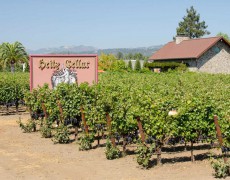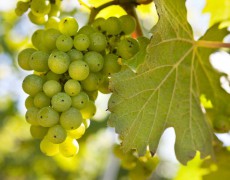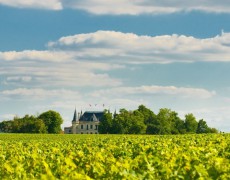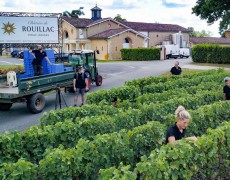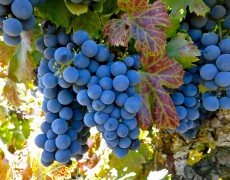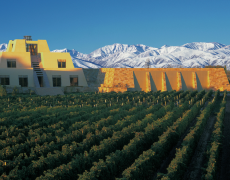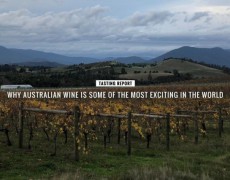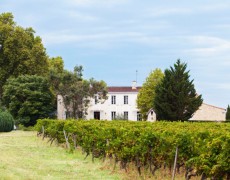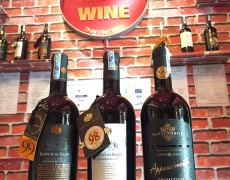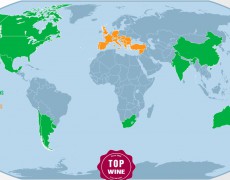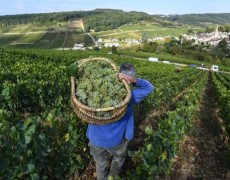While varieties like Blaufränkisch, Zweigelt and St. Laurent may not roll off the tongue as well as better known grapes, Austrian red wine needs to be on your must-try list.

Blaufränkisch, St. Laurent and Zweigelt may not roll off the tongue as easily as better-known grape varieties, but that should not prevent you from trying them. They represent the glorious, refreshing and cherry-tinged triumvirate of indigenous Austrian red wine, something truly different and worth discovering.
These Austrian originals possess distinct personalities. Blaufränkisch leads with peppery verve, dark cherry and blueberry fruit on a medium body that manages to be muscular but toned. It’s more ballet dancer than decathlete. From Austria’s warmer east, Blaufränkisch combines ripeness and freshness in an exciting, elegant package.
St. Laurent is a more moody proposition. It’s tricky in the vineyard, demanding and churlish. In the right hands, however, it produces compelling wines that dance tiptoe on a high wire between gamey, fruity allure and a firm, almost stealthy structure. Pinot lovers looking for something a little weightier should definitely start experimenting with St Laurent.
Zweigelt, the third party in this Austrian trinity, is the unlikely, joyful and immensely versatile offspring of the two. It stems from a successful 1922 crossing of Blaufränkisch and St. Laurent at the viticultural institute at Klosterneuburg.
Where Blaufränkisch brings brooding power and St. Laurent offers finely calibrated charms, Zweigelt laughs at them with light-footed ease, bags of cherry fruit and fresh-faced charm. Don’t be fooled, however. While lots of Zweigelt excel in this easy-going, fruit-forward fashion, more serious bottlings make the utmost of its spicy cherry fruit. They offer weight without heaviness, convincing in their silky depth.
Last but certainly not least, Austrian Pinot Noir deserves a shout-out. In certain well-chosen plots, the interplay of sunny warmth and brisk freshness create those conditions that Pinot craves and rewards. The winemakers of Austria are well-versed in their Pinot craft, handling the ripe, aromatic fruit with expert hands. They know that it is subtlety rather than power that excites Pinot Noir lovers. If you have not yet had an Austrian Pinot, it is high time you changed that.
What all Austrian reds have in common is a mouthwatering, lip-smacking freshness. Their genetic makeup and the region’s climate give them wonderful bite and tension. This in itself ordains them for the table, with better bottles well worth laying down.
Next time you’re looking for a new red, give Austria a swirl and allow yourself to be seduced.
Austrian Red Wine to Try.
Recommended Blaufränkisch.
Prieler 2015 Blaufränkisch (Leithaberg); $50, 95 points. A touch of tar, a hint of bitter almond and brooding black cherry fruit mark the nose and spread freely across the palate with dark but delicious intent. This is dense and firm, with drying tannins but no heaviness. There is freshness and intensity to the dark, brooding fruit that will show its true colors with some more age—but all the aromatic promise is already here. Drink 2020–2035. Skurnik Wines, Inc. Cellar Selection.
Tinhof 2015 Gloriette Blaufränkisch (Burgenland); $80, 95 points. Gentle, seductive aromatics combine subtle vanilla, peony and ripe, dark cherry on the nose. The palate is full but fresh—svelte one moment, plush the other. There is something seamless in the way the flavors merge, unimpeded by the tannins and their velvety crunch. Highly accomplished, very elegant and quite irresistible. Drink 2020–2035. Carlo Huber Selections. Cellar Selection.
Trapl 2015 Ried Spitzerberg Blaufränkisch (Carnuntum); $N/A, 95 points. A wave of ripe, juicy black cherry reaches the nose before hints of cinnamon follow, colored by a lovely floral perfume. The palate is pliable with a fruity, friendly flow, yet this shows depth and charm. The mouthfeel is soft and sinuous, the tannins are fine and have a gauze-like quality that might tip over into velvet any moment. If you need a wine to seduce someone, this might just be it. Simply lovely now but will get much better with age. Drink 2020–2035. Dry Farm Wines. Cellar Selection.
Muhr-Van der Niepoort 2015 Liebkind Blaufränkisch (Carnuntum); $42, 94 points. Aromatic, ripe blueberry notes entice the nose. The merest hint of licorice and tar tingles around the edges. A crushed, juicy berry charm also pervades the palate which dances along with such ease, such abandon, such joy, entirely on tiptoe, twirling, smiling and charming its way to a long finish. There is so much vigor and easy charm, a fresh-faced, unforced and disarmingly honest wine. Yet there is nothing facile. Lovely. Drink 2018–2028. Blue Danube Wine Co.
Gernot and Heike Heinrich 2015 Blaufränkisch (Leithaberg); $45, 94 points. Fresh, almost pristine black cherry beckons from the glass, followed by a gentle whiff of woodsmoke. The medium-bodied palate has the same combination of pristine freshness and gentle oak, showing fresh-faced fruit laced by whisper tannins and delineated by vivid acidity. This is a wonderfully elegant wine with a real force of life inside it. Drink 2018–2030. Craft + Estate–The Winebow Group.
Recommended St. Laurent.
Steindorfer 2015 Reserve St. Laurent (Burgenland); $37, 94 points. A beautifully evocative red cherry aroma perfumes the nose, joined by a gentle oak tone. The palate has a graceful, fine structure of subtle but firm tannins that frame the rich, ripe red cherry flavor. There still is bite and freshness, making the generous weight appear all the more alluring. A touch of cinnamon makes this feel even more sumptuous. Drink 2020–2030. KWSelection.com.
Gebeshuber 2015 Lage Glas St. Laurent (Thermenregion); $73, 93 points. Alluring scents of ripe red and black cherries make for an inviting nose. More of that aromatic black cherry resides on the palate that is smooth and just at the point where St. Laurent is perfectly ripe but still beautifully fresh. A good structure and bright acidity provide a backdrop for the precisely drawn, gloriously pure fruit. It’s elegant and authentic. Vignaioli Selection.
Johanneshof Reinisch 2015 Frauenfeld St. Laurent (Thermenregion); $40, 93 points. An aromatic streak of wild cherry flashes up on the nose and completely takes over on the smooth palate. This is structured by finely woven tannins, corsetting the beautifully judged fruit. At the perfect juncture of freshness and ripeness, this brims with sensuous, red cherry fruit. Circo Vino.
Gerhard Pittnauer 2015 Dorflagen St. Laurent (Burgenland); $24, 91 points.Aromatic ripe, red cherries reveal a tart touch of redcurrant on the nose. The palate has that same appetizing, red-fruited allure: refreshing and juicy, but never heavy. A fresh-faced and authentic red, it has been captured at the perfect intersection of ripeness and crunch. It can even be served a little chilled. Magellan Wine Imports.
Recommended Zweigelt.
Artner 2016 Ried Steinäcker Zweigelt (Carnuntum); $45, 93 points. Shy aromas of wet stone and black cherry mark the nose. The palate shows a levity of juicy fruit, yet also a deep well of black cherry richness that needs opening up amidst the shyness and gentle gauze of fine tannins. The long finish seems to promise further development. A lovely, well-judged and rather elegant wine. Drink 2018–2028. Vintners Alliance.
R&A Pfaffl 2015 Burggarten Reserve Zweigelt (Niederösterreich); $40, 93 points. Sumptuous notes of ripe, red cherry almost veer into ripe plum territory and have a spicy, mellow hint of vanilla and cinnamon. The palate replays these flavors, complete with finely woven tannins that seem to boost the aromatic cinnamon notes. A rich wine but without superfluous fat. Lovely, velvety and sensuous in a modern, international style. Esprit du Vin.
Schloss Gobelsburg 2015 Reserve Zweigelt (Niederösterreich); $38, 92 points.There is an intriguing, aromatic quality of nettle amidst the ripe, red cherry flavors on the nose. The palate has an inviting, sinuous slenderness, with still slightly grippy but fine tannin. Red cherry ripples across the palate, given precision and vibrancy by lovely, taut freshness. Such an elegant but lively wine, full of joy and measure. Skurnik Wines, Inc.
Kohl 2015 Kohloss Zweigelt (Niederösterreich); $30, 91 points. Fragrant plum and red cherry notes have an alluring hint of cinnamon. The palate retains these rich, aromatic flavors but presents them on a fresh, slender canvas that shows both fruit and spice. Lovely and highly appetizing. Vignaioli Selection.
Recommended Pinot Noir.
Malat 2015 Reserve Pinot Noir (Niederösterreich); $48, 93 points. A heady whiff of woodsmoke combines with aromatic cherry fruit on the nose. The beautifully taut palate allows freshness to show the purity of the fruit. Right now the oaky smokiness still envelopes the firm fruit, supported by a fine tannic structure. Wait a little and this will blossom. Drink 2020–2030. Circo Vino.
Heinrich Hartl 2014 Reserve Pinot Noir (Thermenregion); $36, 92 points. This is brooding on the nose with the allure of an elderberry aroma. The same note dominates the palate which has a smooth, sensuous body, still held tight by brisk, fine tannin and lively acidity. There is almost stealthy, surprising grip. With its ample fruit this is already enticing, but structure and freshness promise more pleasure to come. Drink 2018–2028. KWSelection.com.
Esterházy 2015 Pinot Noir (Burgenland); $15, 90 points. A gentle hint of soft and mellow vanilla frames the ripe, red-cherry fruit that appears readily on the nose. The palate discloses that same mix of fruit and oak influence, wrapping fresh cherry, both tart and ripe, in a rounded, smooth cloak of smoky vanilla. Tannins are fine and gentle. This wine is both fresh and fruity, with a bright, fresh finish. Wein Bauer Inc. Best Buy.
Source: winemag.com
